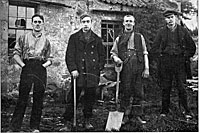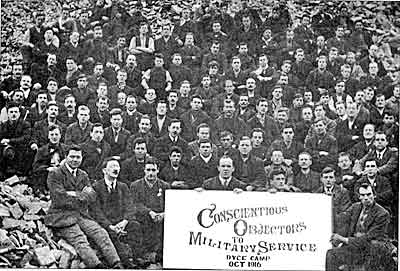|
The first settlement was at Dyce near Aberdeen. There, for ten hours every day except Sunday, the men were expected to move stones in barrows from the mines to the crushing machines and then to the roads where they were needed for repairs.
|
There were no proper buildings at Dyce. Men, thin and sickly after months of malnutrition and insufficient exercise in prison, returned after exhausting days in the mines to dilapidated tents, thrown out by the army as unusable. Soon, as winter arrived, the settlement turned into a field of mud; clothes and blankets wet from the persistent rain, never dried.
Ramsay MacDonald, who constantly argued for decency towards the conscientious objectors during the many debates in the Commons, visited Dyce. After his visit he described a scene of misery and absurdity to the House of Commons.
|
|

:: Derelict buildings were used for accommodation as weather conditions deteriorated.
|
|
'It had been raining, raining, raining for days. The roads from the station to the village were simply huge, swaying masses of mud ... In the tents there was mud . . . There they are, with barrows and shovels, trying to do navvies' work. They could not do it. There is confusion. There is no order . . . They were soft of muscle, their hands were blistered, their backs were sore . . . My point is that this was not national work. It was not useful work . . . These men simply felt that they were being punished, and that they were asked to do this because the state wished to punish them ... It is sheer folly. It is waste. If you are going to punish these men, punish them honestly.' MPs were not impressed. 'We can ill afford in this country,' said one, 'to coddle and canoodle these people.'
Many felt this attitude to be perfectly correct. Worse things were happening at the front, where between July and October the Battle of the Somme had resulted in more than 400,000 casualties. People hearing of their sons' deaths in France, found discussions about the treatment of conscientious objectors irrelevant and even offensive. But this was not the point. The issue was the same as it had been when Asquith introduced conscription: a matter of moral liberty, of the relationship between any one man and the state in which he lived. That argument did not depend on events.
|
|

|
|
:: COs at the Home Office Work Centre, Dyce, Aberdeenshire. October 1916, shortly before it was closed following the scandal over the death of Walter Roberts on 8 September 1916.
|
|
|
|
|
